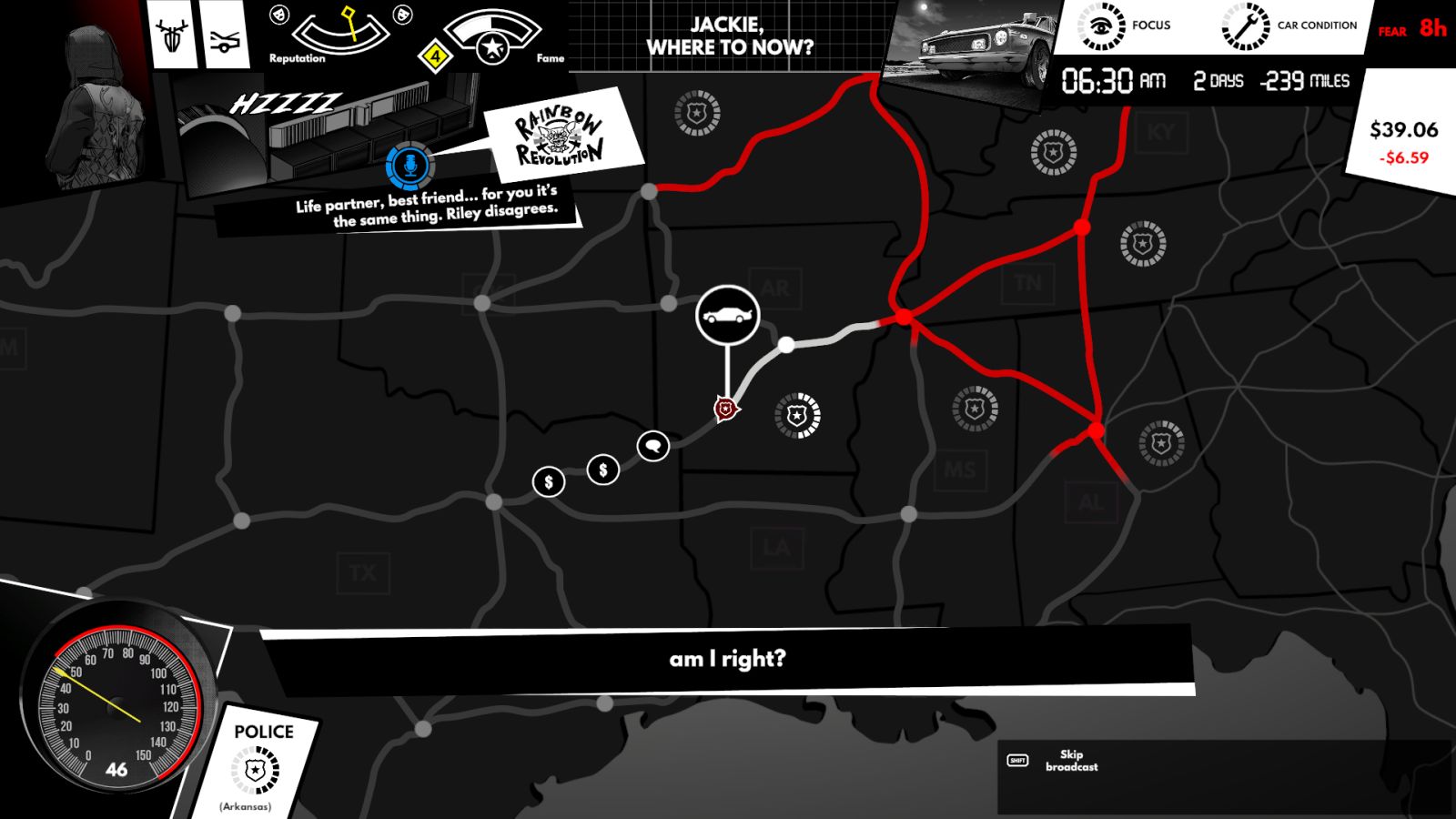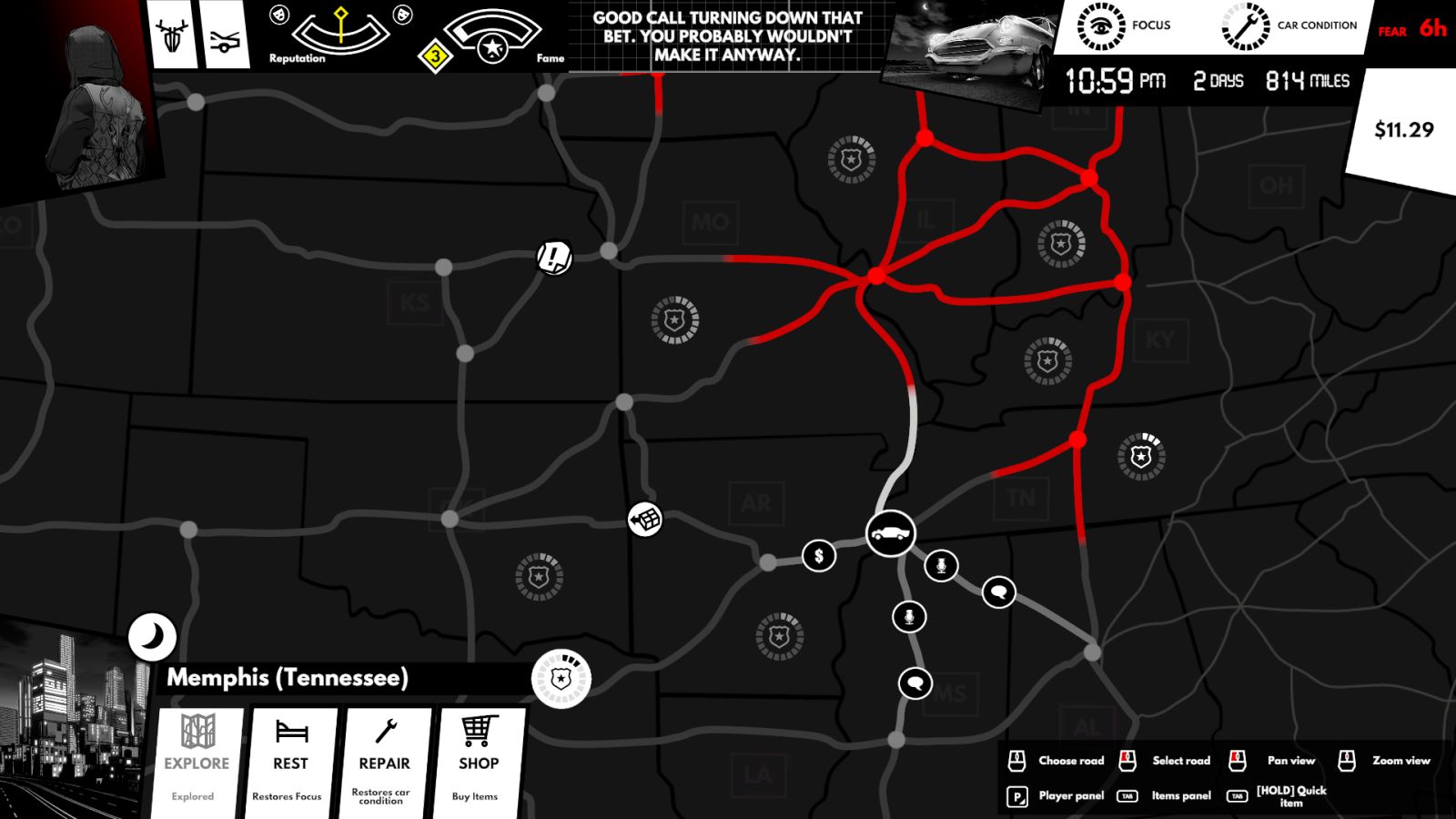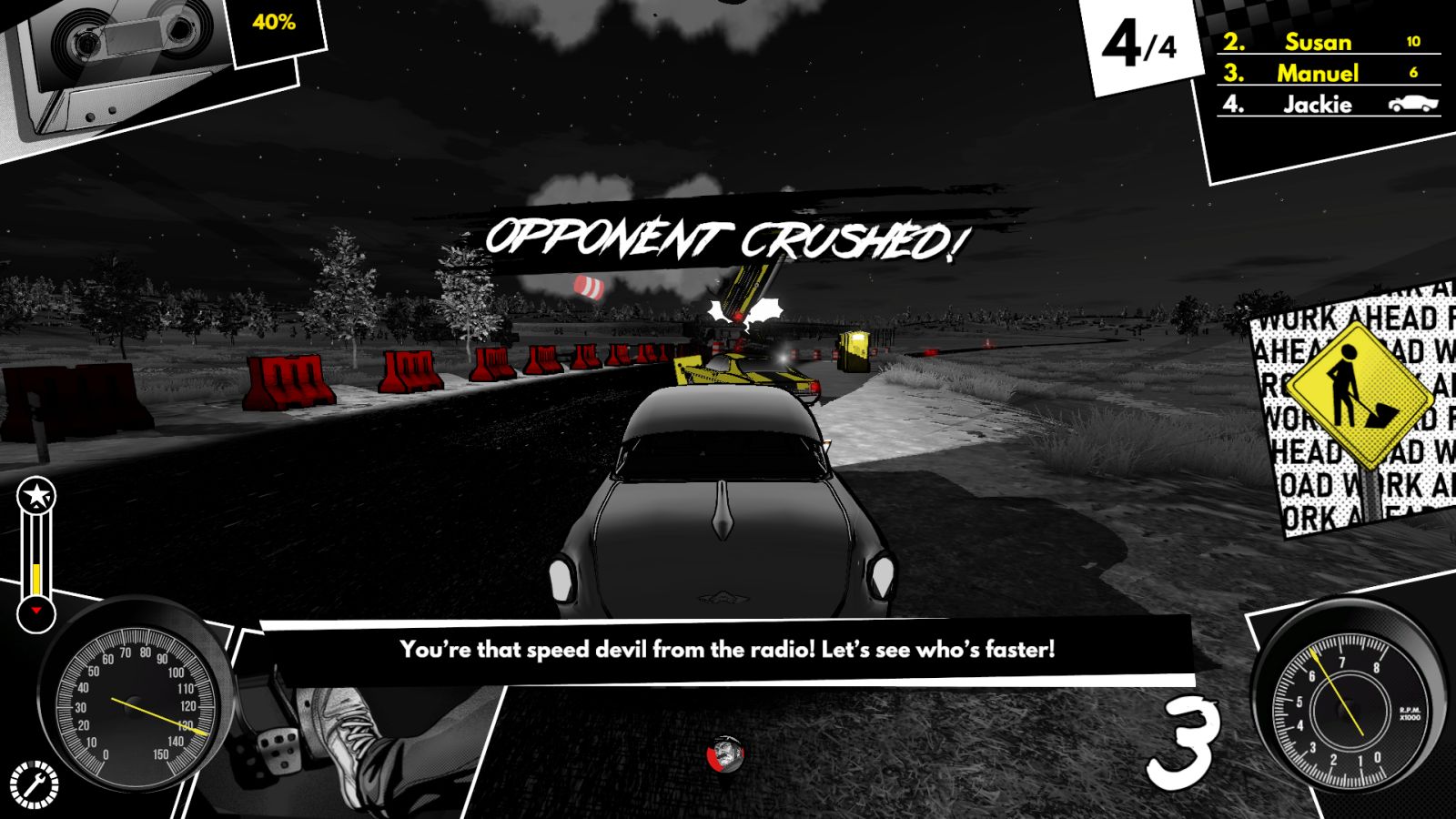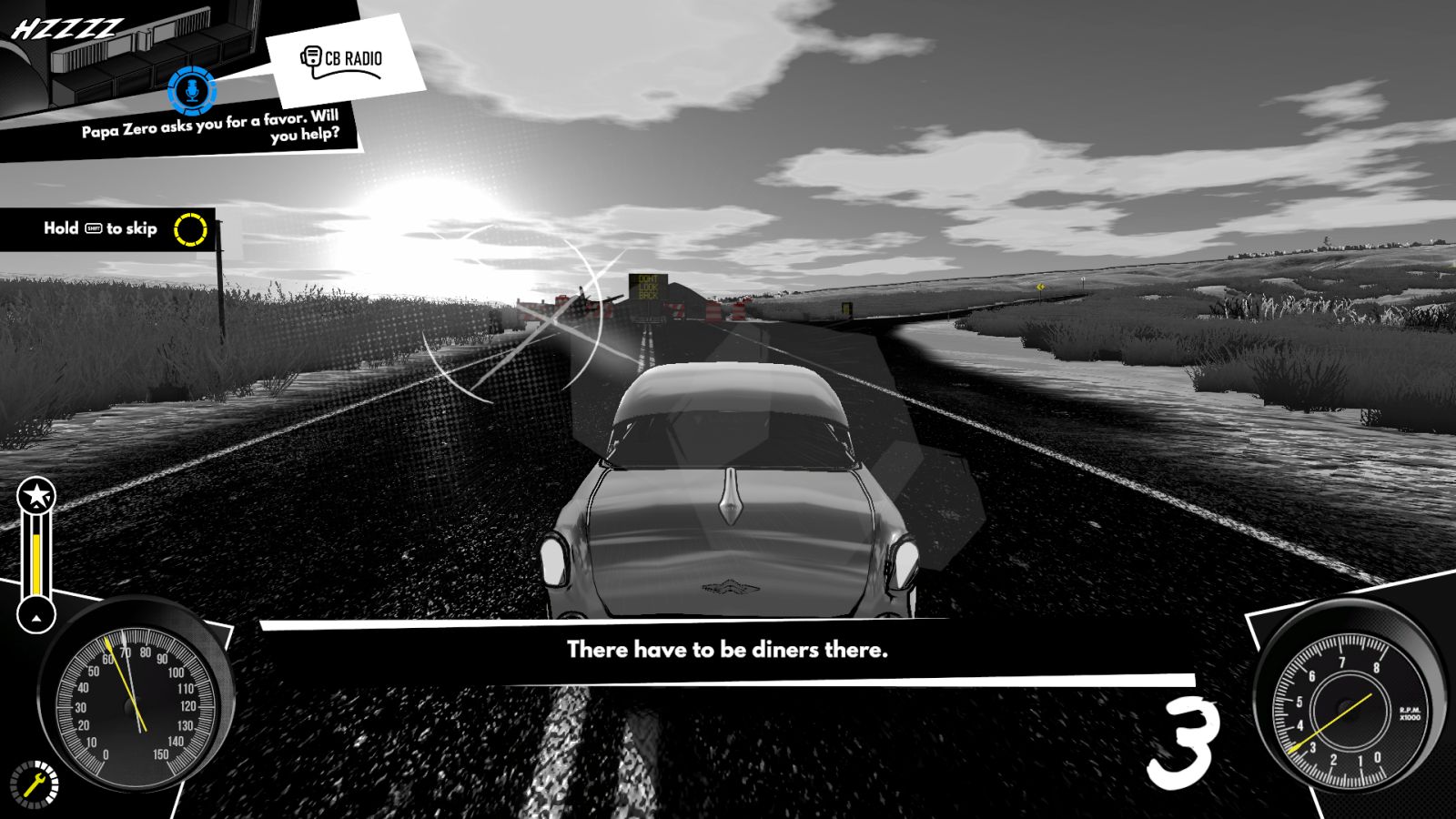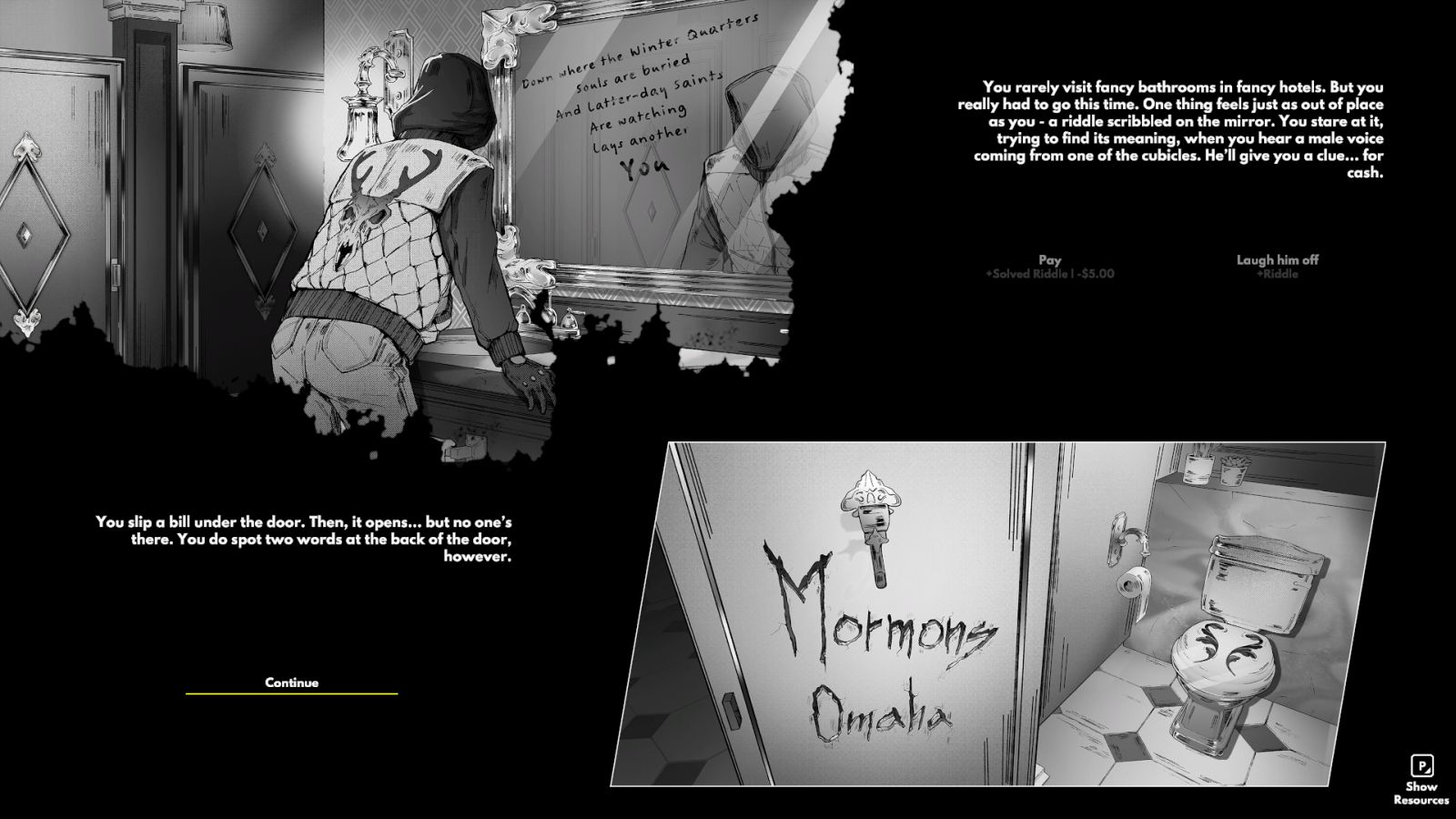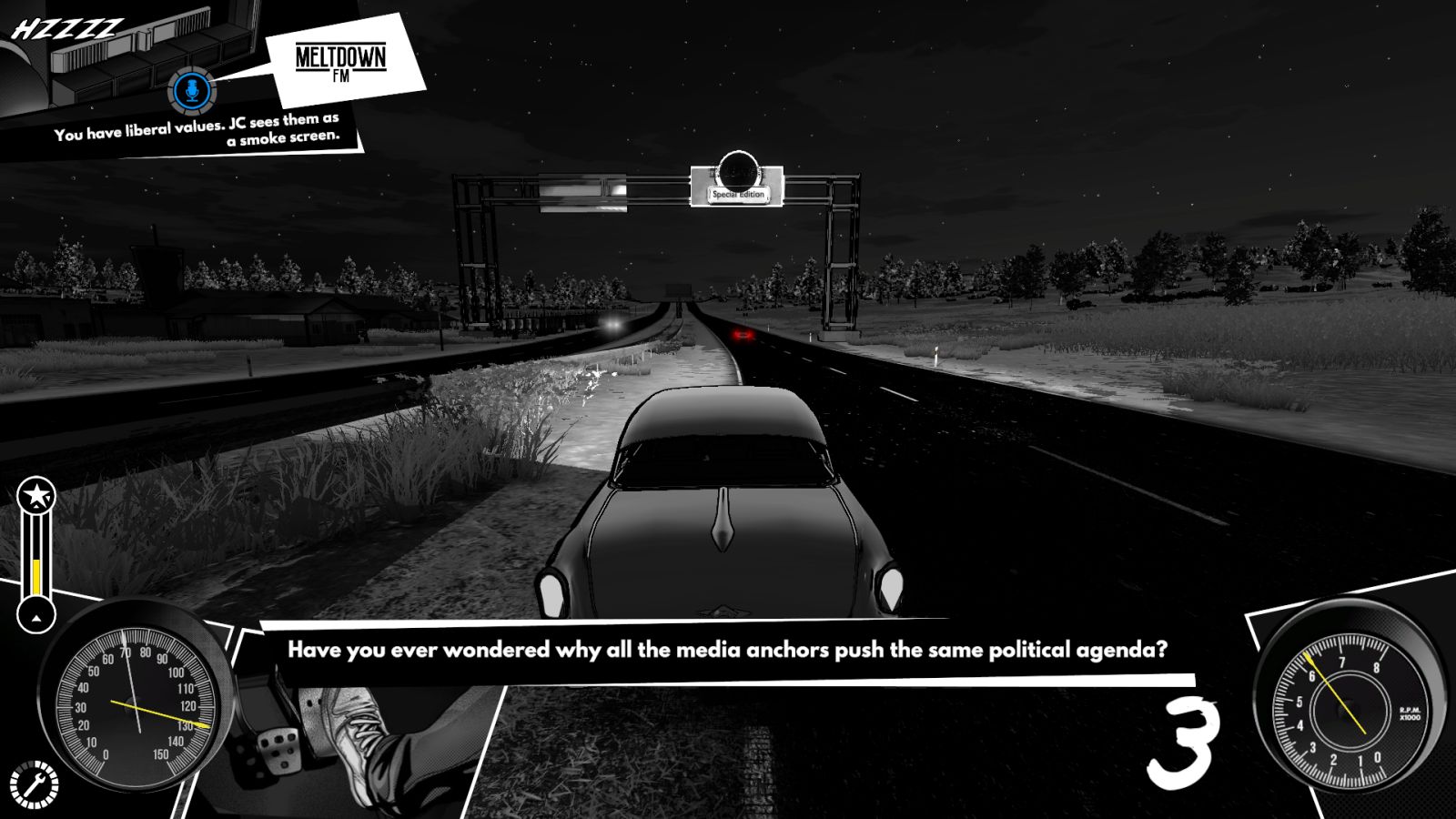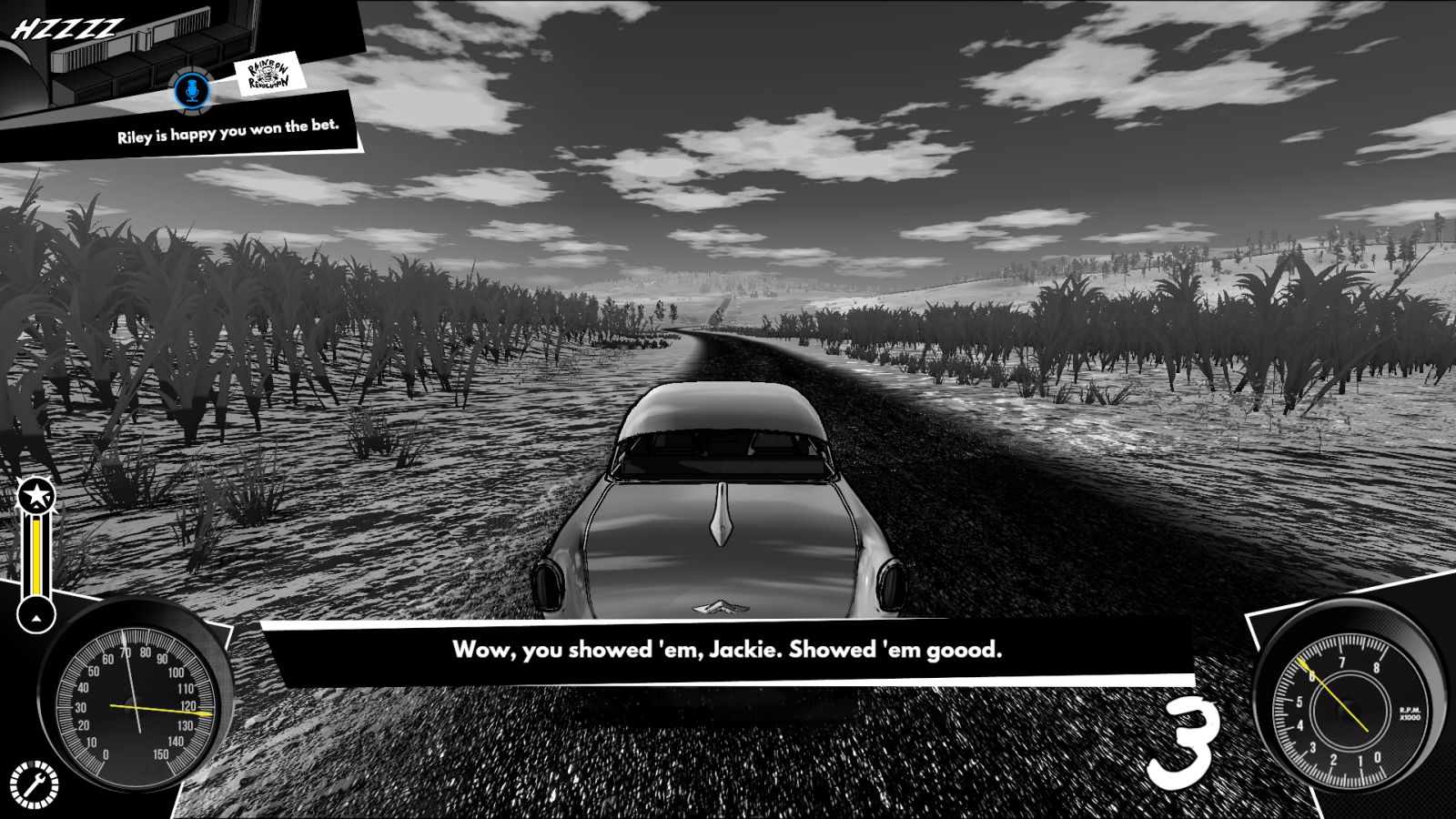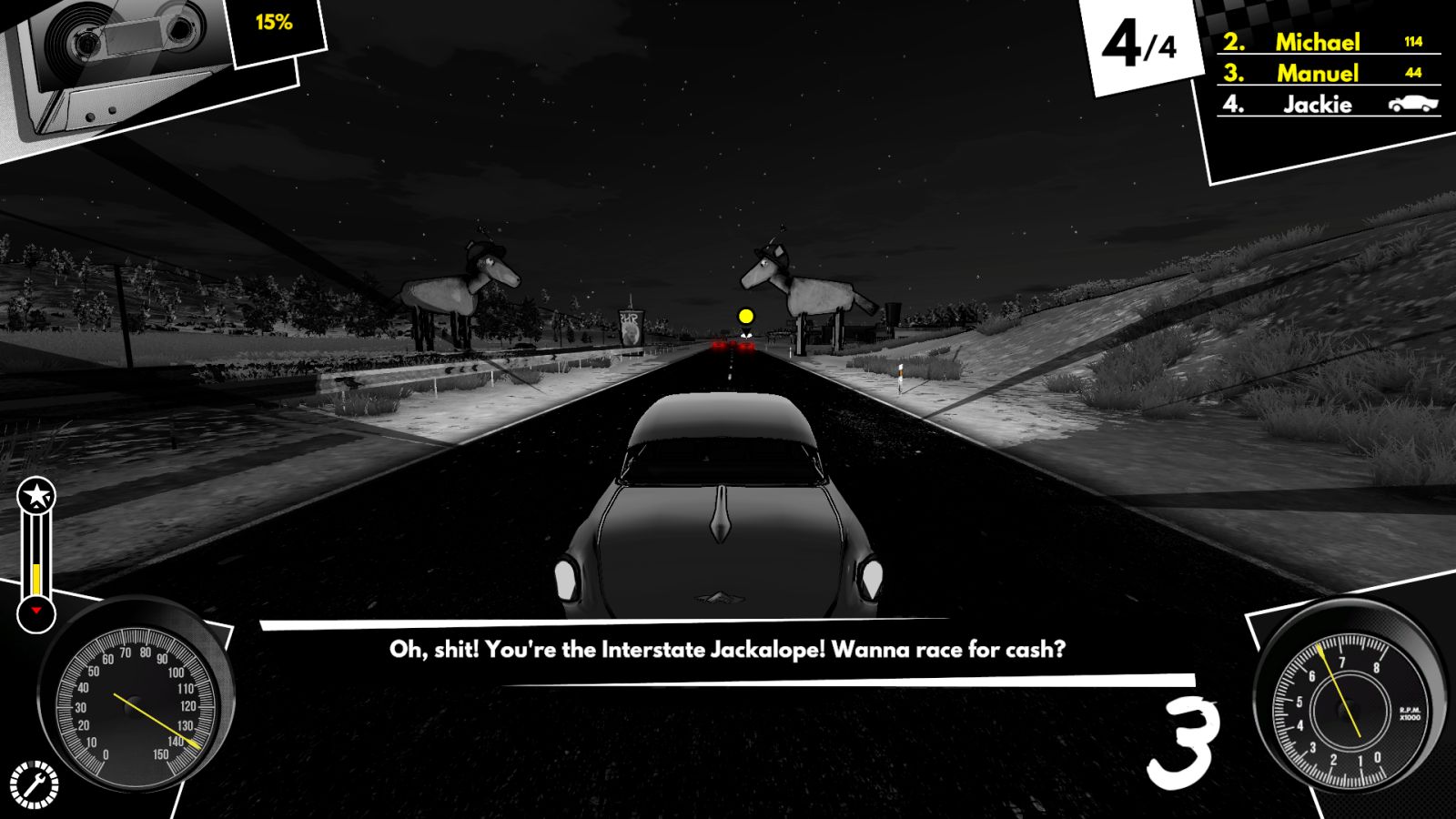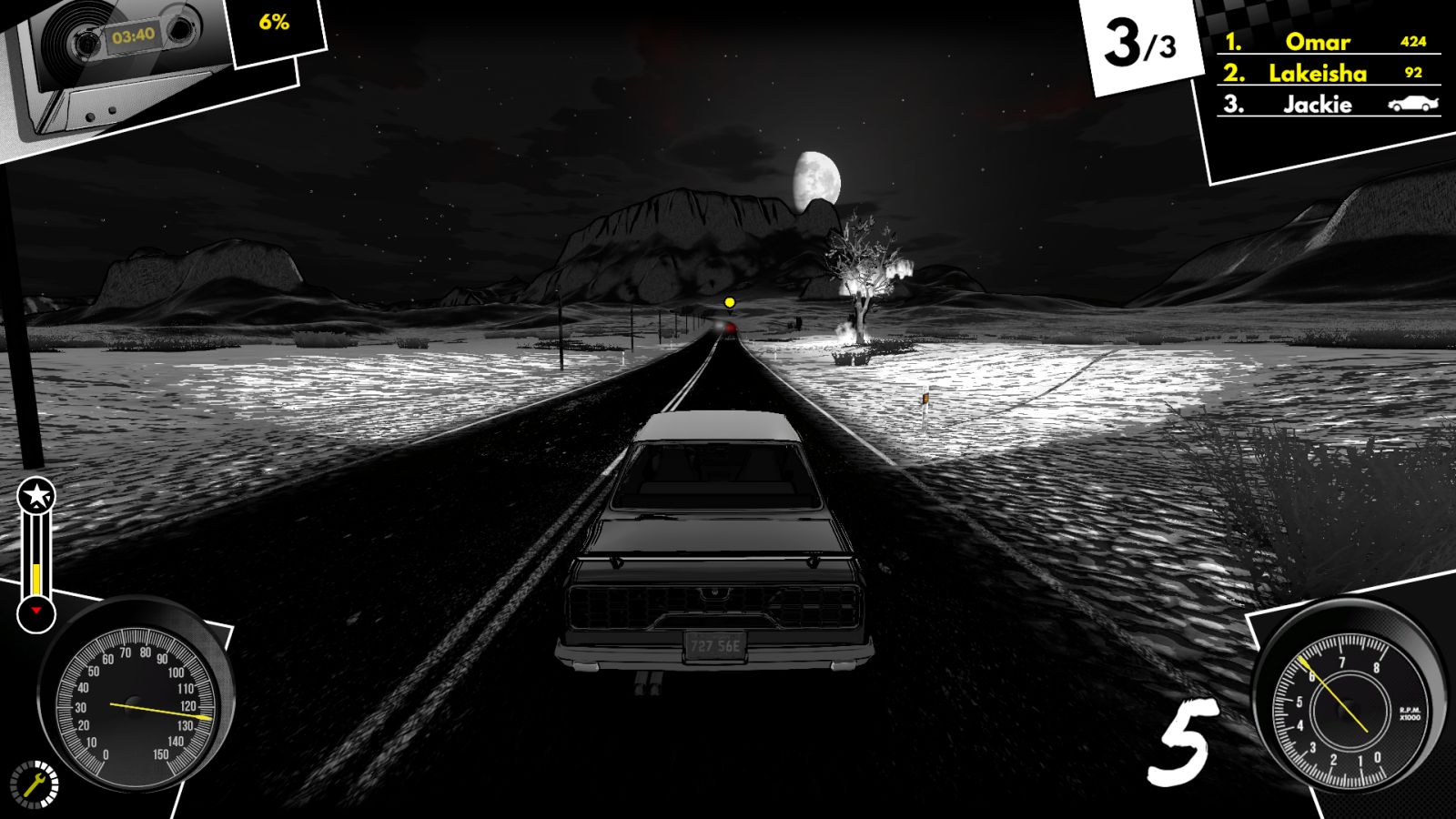Heading Out is part narrative game, part racing game, and a complete love letter to American folklore. Splice in roguelike elements and you have a game with the potential for great replayability. The key word there is “potential,” as the game occasionally has trouble keeping all of the plates spinning, so let’s dive into what the game got right and what it could have done better.
You play as Jackie, also known as the Interstate Jackalope. He’s something of a folk hero who’s trying to escape his past. Fitting the theme, you start the game by choosing some rumors about yourself, and your choices determine what songs are played on the radio while driving. Afterwards, you’re informed that beyond running from your past, you’re speeding to catch up with a legendary racer to challenge them. With your two goals set, it’s time to drive and don’t you dare look in that rear view mirror.
While racing is a part of this game, a lot of your time will be spent in non-driving sections, directing your path along the web-like map of the interstate from a bird’s-eye-view. On this map, you’ll run into highway events such as drivers who you can race to win cash, narrative sections called A Glimpse from the Road, and talk show segments with recurring hosts. On top of that, you’ll have to evade the police and avoid speeding to keep your wanted level low, thus giving you better outcomes if they pull you over. Now factor in car condition for when your car gets banged up during races and escapes, a focus meter you need to maintain to drive without falling asleep, gas money so that you don’t have to steal it, and reputation and fame levels to make sure you come out on top in sticky situations. Oh yeah, and remember that whole ‘escaping your past’ thing? Well it’s quite literal, as your past is represented by a red aura called “fear” that slowly envelopes the highway system. If it catches you, you’re done.
Just because you’re on the run doesn’t mean you don’t have time to stop and smell the diesel. You’re able to stop at cities where you can explore, rest to regain focus, and repair your car. However, these actions cost time and money. Then you choose which route you want to take to the next city, each of which will have different highway events. As you can tell, it’s a pretty elaborate economy the devs concocted. There are some ways you can get a leg up, like picking up packages and passengers to deliver to specific cities, but this system has some flaws. Every once in a while the game wanted me to go in a completely different direction than where I needed to be. Even if I chose to pursue these side objectives, the end location would put me too close to the creeping fear, making the run impossible to complete.
At one point the game laid out a really cool treasure hunt that had me drive across multiple states, but I didn’t get to finish it because the game wanted me to take a hard turn north, the legendary racer was to the south, and the fear was on my heels. Even if I were to leg it at max speed, I would have been soft-locked out of winning. I was really invested so it sucked that I had to skip out on it. I feel like the game could have allowed the player to finish these quests across multiple acts, bolstering the rogue-like gameplay and narrative experiences.
Moving on to races, they come in various forms. The aforementioned bets and police chases are common, and then some other random events have races tied to them. Basically, in a race for a reward, it’s you against one or two other drivers, speeding along the highway to be in the lead by the time a song on the radio finishes. Songs typically last about three minutes, and a lot can happen in that time. That is, if you let your own hubris get the best of you, make a risky move, and get blown off course. If I’m being honest, races are pretty easy, and I regularly racked up hundreds of–what I assume to be–meters over my opponents. I bumped up the difficulty to challenging, the highest level, and while I still never lost, races were admittedly a little tighter. Although, the benefits your opponents gain from challenging difficulty feel largely artificial, as it just starts them way ahead of you to start the race. In the rare case where you do find yourself behind your competition, you can opt for taking one of the off-road detour routes that occasionally pop up to regain the upper hand. There’s also quite a lot of fun to be had in challenging yourself to weave around traffic and hit bumps with as much velocity as humanly possible, both of which will increase your fame level.
One of my favorite parts of races is just how dirty they can get. Cars can clash, crash, and get thrown off the road. At one point, I bumped into my opponent’s car to dodge out of the way of oncoming traffic. It wasn’t too bad for him, as I transitioned back into the wrong lane and he kept his position. I guess he took it to heart, as the next thing I knew I saw him shoot in from the right side of the screen trying to ram me, only to miss and slam right into the guardrail in front of me. I drove into him, sending me into the right lane again as oncoming traffic sped forth and brutalized him. It all happened in the span of a few action-packed seconds.
If you find yourself the recipient of road rage and your car gets totaled, then you can use a revive to get back on track, albeit slowly, and with a negligible deduction to fame gained from performing stunts. Be warned, you only have a limited use of revives, so try not to go too demolition derby on your enemies. Overall, while the races aren’t stimulating in their difficulty, the shenanigans that you can get up to can make up for it tenfold.
Remember, in bet races you have to race until the end of the song. Police chases, on the other hand, offer a chance to escape from the race early given your wanted level is on the lower end. You can outmaneuver the cops, swerve around their blockades, and beat them to the county line. If you drive too slow, then they’ll catch up and arrest you, which is portrayed by a meter at the top of the screen. If you’re diligent, then they’ll never get the chance, as it’s an exceedingly slow process.
There are four acts in the game, each of which is beaten when you race the legendary driver. One of the game’s roguelike features is that, at the start of every act, you’ll unlock a new car to drive. However, you don’t ever get the stats for them, you just have to feel them out. For example, in the third act, I unlocked the European model. It’s pretty clear it was built for the Autobahn because if you even graze a blade of grass by the side of the road, the car will fishtale so hard you’d think it’s a mermaid. That being said, it’s nice that cars have different specialties, as it lends to the dynamic situations you’ll face while racing; one car might be better at off-roading while another is a speed demon on the asphalt alone.
As to why you’re racing the same driver four times, that’s for you to find out on your own. If you’re paying attention, looking and listening carefully to the little details scattered across the world, you might get a glimpse of what you’re up against.
In addition to various cars, further acts unlock new road hazards, police tactics, racer behaviors, and driving challenges, with the former three being a much better addition than the latter. One of the road hazards that’s added is a pothole that’s undergoing maintenance, meaning you have to maneuver around it; it does a good job of keeping things fresh. Police tactics like blockades are added, giving you more to look out for during chases and on the highway map. On the other hand, the added driving challenge is–I kid you not–painstakingly driving through traffic until a radio song ends. If you don’t want to participate, you can always wait for it to clear up, which gives the fear a few hours to catch up to you. Given that the other additions are good, I can mostly forgive this one, but it really does feel like they’re throwing a monkey wrench into your run. It’s like they’re saying “be bored or draw 25”.
Heading Out has a lot of narrative content to offer, mostly in the form of A Glimpse from the Road segments. These can be triggered by choosing to explore a city, or they can be found dotted across the highway system. You never know what you’re going to get with these. Maybe you’re helping a person in need, only to get scammed. Maybe you’re faced with a moral dilemma, or perhaps you’re driving down the highway only to encounter a mythical creature that regenerates your focus. Some of them even offer recurring storylines in your run. One thing’s for sure, I enjoyed every last glimpse. Although, as I mentioned with some of the delivery quests, I wish that these glimpses would incorporate more roguelike elements. While some of the glimpses offer recurring stories, I never saw them stretch beyond an individual act. It’s less of a “Hades” type affair where you’re gradually uncovering more interconnected lore and dialogue, with the story slowly unfolding as you chip away at it over multiple runs, and more so trying to grab as many glimpses as you can in one act and hope you don’t get repeats in the next.
A substantial chunk of your time spent driving will also be spent listening to the radio, whether it be talk or jams. The music was consistently outstanding and the adrenaline-pumping bangers, upbeat jazz, and melodic tunes fueled my racing. This is one of the few games where I would recommend buying the soundtrack outright. The talk radio shows, on the other hand, are hit or miss. There are four radio personalities, each with their own shows. You can run into radio segments on the highway or one will play at the end of a race. Sometimes they hit hard, other times they suffer from scripting problems and certain lines can seem a little inauthentic.
I consistently loved listening to JC Leonard, a dishonored radio host caught in a hurricane of scandals who stormed into his broadcasting building, barricaded himself in his old studio, and started a show called “Meltdown FM.” His airings consist of nihilistic ramblings, personal regrets, and what he sees as harsh truths about the world. Believing himself to be the lowest of the low, he wants to drag everyone down with him, verbally of course, before the police break down the walls of his kingdom of nothing.
There are other radio hosts, including Riley of the Rainbow Revolution station, a paradoxically pathetic and brave young woman who’s run away from home and started her own pirate station. It can be jarring to listen to her find a week-old cookie on the floor and scarf it down, or cringe inducing to hear her hype herself up to call in a pizza delivery, accidentally doxxing herself in the process. At the same time, she’s unapologetically herself, does the right thing when push comes to shove, and she’s managed to start up the station all on her own–with funding from her drug dealer.
Then there’s Joy of Cooking With Joy, a regretful middle-aged woman who’s spent her whole life running, only to end up in worse situations. Now, she’s taking a stand by divorcing her abusive husband, taking her daughter Hailee with her, and transforming her once-failing cooking show into rant sessions that provide a beacon of hope for those in similar situations. She’s both brave and disillusioned with the current social system.
Finally, we have Steve Landry of Virtue FM, a conservative commentator who’s an unhinged mix of Alex Jones and Rush Limbaugh with a sprinkling of Senator Armstrong from Metal Gear Rising. He gets the least amount of characterization out of all the radio hosts, spending most of his time either lambasting you for the trouble you cause or promoting conspiracy theories, and making a tidy profit while doing it.
It’s really interesting listening to the various hosts reflect on and project their lives and beliefs onto Jackie. For example, Riley is a young woman, politically progressive, and lesbian, and she insists the Interstate Jackalope is also a woman, both to fulfil her ideological needs to see a rebellious liberator pushing back against the system and to fulfil her crush on Jackie. Steve had his cushy life handed to him on a silver platter that came with silver shackles, and he resents the sheer level of freedom that Jackie has. Joy can relate to both the newfound freedom that her and Jackie share, as well as the problems running from your past brings. At the same time, she’s worried about Jackie’s influence on the youth, including her own daughter and Riley. Ever the egotist, JC just likes that you do whatever you please with, from his view, no regard for what happens next.
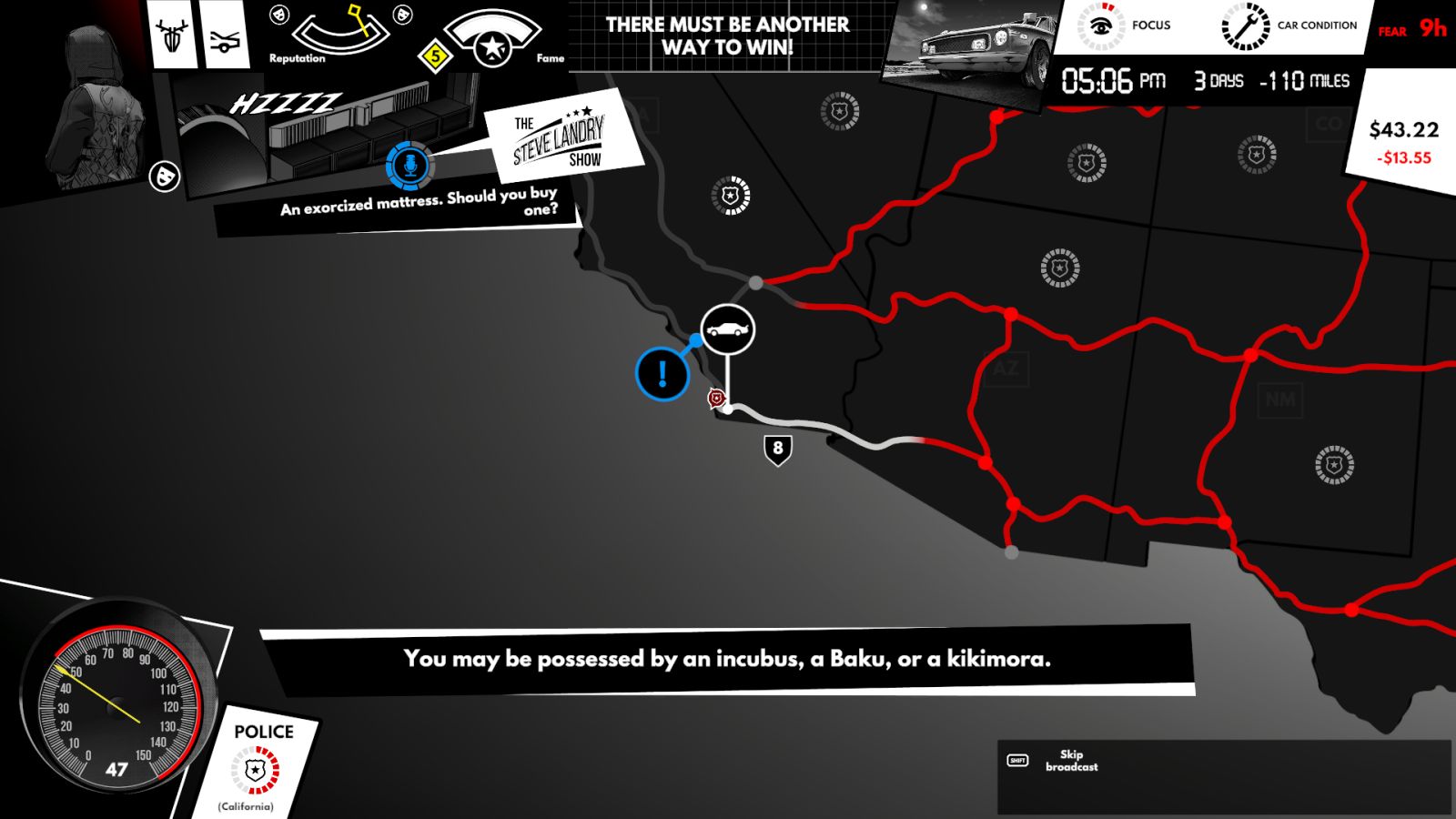
One big pain point I have with the game is that it doesn’t progress the radio hosts’ current stories. This is because each radio segment is randomized–a part of the rogue-like experience. The hosts cannot have linear stories because the system itself would not allow for it, which I believe does the game a disservice here from both a technical and a narrative standpoint. For example, I had multiple radio segment re-runs within the same run, at one point I ended a race and listened to a segment, only to immediately listen to the exact same one again when I ran into it on the highway.
On a narrative note, we never get to see them grow or evolve, just remember and reflect, but I suppose that could be the whole point. As Jackie, we’re moving fast to escape our past, no time to stop. These hosts are both reflections of us and an extension of the game’s themes. Like a roadside oddity, a warning sign, that we merely get a glimpse of, they’re in front of us, then simply gone in the rearview mirror. But, no matter how thematic it may be, it still leaves the hosts feeling mostly incomplete by the end.
I feel like it would have been better to play segments dedicated to progressing the hosts’ stories at certain points, with the rest being randomized. Instead, we got hosts with no personal development, leading to none of them feeling like fleshed-out characters. Although, they do comment on actions you take on your journey and the questions you answer at the beginning of every run, which makes the world feel believable. It’s genuinely disheartening to hear Riley’s disappointed reaction to Jackie stealing from a gas station if you run out of money, but it will have no lasting impact on her opinions of Jackie. I would have loved it if the game had taken it a step further by giving the hosts their own endings effected by our choices as Jackie.
On a more positive note, Heading Out perfectly captures the breathtaking grandeur of the American great outdoors and the oddities of the American roadside. You might come across two giant wooden horses with soldier helmets flanking the road, or maybe you’ll breeze past a blazing tree in the dead of night. There’s a good amount of variety in levels to really encapsulate the diversity of American geography. The game achieves these feats despite using a palette that is almost entirely monochrome, only using splashes of color to add to emotional weight when appropriate. Blue streaks the ultimate racer’s car to show speed, fear is represented with red to invoke anxiety, and off-road detours and road signs are highlighted with yellow.
The game has a clear comic book style, with footing the gas, changing gears, and road signs appearing as comic book panels that jump on and off the screen. When you start moving really fast, you’ll get action lines to emphasize the speed. This style extends to the glimpse of the road sections as well, as it will often unfold panel by panel. The comic book inspiration really does enhance both the aesthetics and gameplay.
At some point during act three, the game started to run out of gas. The edge of managing the ecosystem was dulled because I knew, no matter what I did, I would make it to the end. Some of the radio tidbits were reruns, as were some glimpses from the road. I had basically mastered the highways, leaving little room for the interesting vehicular mayhem unless I went out of my way to start it. Both bets and police chases devolved into holding the W key to go forward for minutes on end while my eyes glazed over due to the lack of challenge. At one point I zoned out, smashed into a tree, and won anyway.
Still, there were beautiful moments that would snap me out of my daze, usually some little detail along the road or an appreciation for the grandeur of the map. There was something so enthralling about speeding through the night, down the highway in the American Southwest, the moon cradled by a monochrome plateau, illuminating nearby mountains with a milky sheen. A little further down the road, I took a detour to drive through a colossal rib cage once belonging to a beast of a bygone era. It was these moments that kept me going through the last part of the game.
Overall, Heading Out tries to juggle a lot of features and does well on many of them. At the same time, the game holds itself back in some areas, particularly the gameplay aspects involving rogue-like randomness. I don’t think I’ll ever return to Heading Out for another run, as I’ve gotten most of the juice out with a few squeezes. Relying on RNG to experience the parts I missed while sitting through countless reruns just isn’t appealing to me. Although, I’ll largely remember the game for the impact it made on me with its true devotion to the American mythos, great narrative, stellar aesthetics, themes of regret and hope, and excellent attention to detail.

